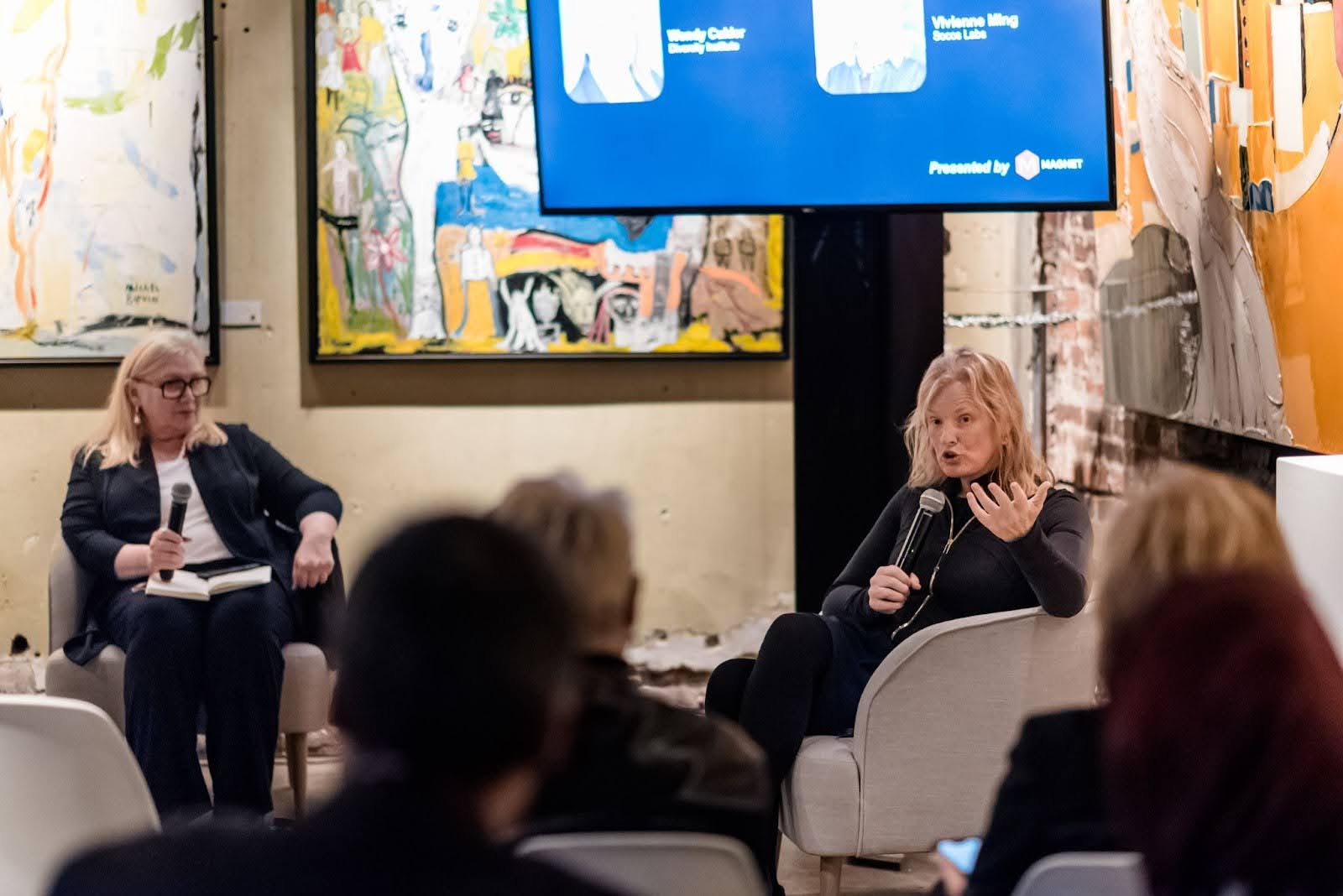How artificial intelligence can help address the skills gap

Wendy Cukier, founder and academic director of the Diversity Institute (left), and Vivienne Ming, theoretical neuroscientist and co-founder of Socos Labs, discuss the risk artificial intelligence poses to inclusion and accessibility during Magnet Network Live.
From Oct. 23 – 24, Magnet Network Live brought together more than 200 leaders, government officials, technology innovators, academics and business professionals. The event, which took place in Toronto’s Distillery District, featured panels, workshops and a fireside chat.
Wendy Cukier, founder and academic director of the Diversity Institute (DI) and academic research director of the Future Skills Centre, participated in a fireside chat with Vivienne Ming, theoretical neuroscientist and co-founder of Socos Labs. Ming has launched nonprofits and companies on artificial intelligence (AI) projects that focus on education, the workforce and health. In her keynote she addressed the potential of AI while noting the need for caution in its use.
Their fireside chat, Disrupting the Status Quo: Innovation, Inclusion and Tech Risks, went deeper into the topic. It focused on how diversity and inclusive innovation can drive change, while highlighting the risks technology like AI poses to inclusion and accessibility.
Cukier opened the discussion with a snapshot of AI in Canada. “With over 140,000 AI professionals in 2023, research shows that Canada is a leader in AI talent,” she said. Cukier noted that while there are known gender pay and employment gaps in technology fields, Canada has seen the largest year-over-year growth worldwide for women in AI. Nonetheless, she said, despite the wealth of AI talent, adoption of the technology in Canada lags behind that in other countries; for example, in the U.S., nearly three-quarters of businesses surveyed are using AI in their operations, compared to 35% of Canadian businesses.
How artificial intelligence can advance equity, diversity and inclusion
Cukier emphasized the potential for AI to help inclusion in pathways to employment, advancement and leadership. “We know that diversity drives innovation and creativity,” she said. She pointed to research that shows diverse teams bring varied experiences, which leads to more creative and innovative solutions, and that diversity and inclusion are drivers of economic growth, because they help to create a more equitable and innovative economic environment. Cukier then provided examples of how AI can embed equity, diversity and inclusion (EDI) into organizations at a systemic level, close skills gaps and create more equitable opportunities for equity-deserving groups.
Small and medium-sized enterprises (SMEs), for example, can use AI to craft more inclusive job descriptions and ensure recruitment processes reach these diverse demographics effectively, improving representation in the workforce. Recruitment platforms powered by AI enable SMEs to tap into a larger, more diverse talent pool, including immigrants, racialized groups, and Indigenous youth, by using algorithms that reduce bias and focus on skills and experience rather than traditional credentials. Other uses of AI are the creation of inclusive, bias-free imagery and messaging, ensuring that marketing materials reflect the diversity of the consumer base in marketing; and offering personalized learning paths and development opportunities for employees from diverse backgrounds, including Indigenous youth.
Cukier said that some of the barriers to adoption among businesses include too few employees with AI skills, concerns about accuracy and skepticism about how the tools work. “Businesses are concerned about the accuracy of the AI algorithms they are using,” she said, pointing to recent data that found over one-half (54%) of businesses were concerned they might be making decisions based on poorly designed algorithms. In the same survey, just under one-half (47%) said they lack the expertise among their workforce to validate and verify the algorithms they have in place. Cukier also highlighted survey data that showed 44% of respondents had not received any training in AI from their employer.
Why “guardrails” are essential in artificial intelligence implementation
Ming noted the potential for AI in mental health and discussed new applications for mental health support that help counsellors gather information from social media. She highlighted the importance of high end scientists’ deep AI skills for solving challenging problems, while ensuring guardrails are in place for the ethical use of the technology. Cukier then discussed the three different levels of AI skills—deep, mid-level and basic literacy—highlighting the importance of each, including, critically, the most fundamental level. Knowledge of core concepts, familiarity with generative AI tools and knowing how to use AI tools is essential for being able to use the skills at more advanced levels.
Cukier and Ming discussed how even Geoffrey Hinton, widely considered the godfather of AI, and who won this year's Nobel Prize in Physics, says there are risks posed by the rapid development of current AI models. Noting this, Cukier said that generative AI can replicate and amplify societal stereotypes, further entrenching biases, and that human biases can be transferred to machines, because technologies reflect the qualities of the people who develop them. “Implementing guardrails at the international, national and organizational levels is essential for the responsible use of AI,” she said.
There is urgency for employers to create policies and implement training on using AI tools in the workplace, Cukier said, noting that employees are already using these tools, with or without guidelines from employers, and this is likely to increase as AI tools become more widespread. If employers do not put policies into place and provide training, then the adoption of AI into business operations down the line will be more difficult.

Wendy Cukier, provided closing remarks for the multi-day Magnet Network Live event where she celebrated the long history of collaboration between the Diversity Institute and Magnet.
On the final day of the event, Cukier provided remarks during the closing ceremony. She highlighted projects that DI and Magnet have collaborated on throughout the decade, with the support of the Future Skills Centre, including an ongoing project with the Ontario Chamber of Commerce, Skills Bridge. The project developed a learning management system that provides training in skills like management, numeracy, innovation, problem-solving, adaptability, entrepreneurship, digital skills and writing, along with EDI training, to SMEs and their employees. So far, the project has engaged 55 chambers of commerce, 861 SMEs and 691 employee-learners, and a majority of users have reported positive feedback. Such projects, Cukier said, are only some of many.
“The Diversity Institute has enjoyed a long history of collaboration with Magnet, and I look forward to more impactful initiatives that help to advance EDI in Canada’s labour market.”